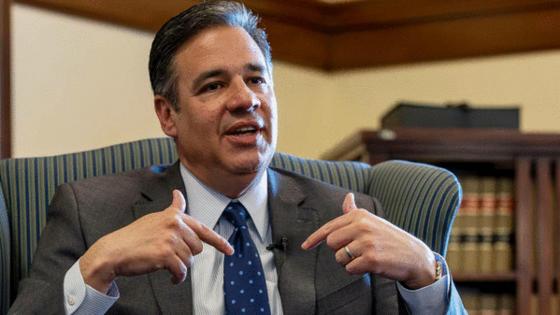Idaho Supreme Court rules on AG Raúl Labrador's open meetings lawsuit in University of Phoenix deal
Published in News & Features
BOISE, Idaho — Idaho officials will spend more time in the courtroom over the state’s closed-doors decision to purchase the University of Phoenix after the Supreme Court on Thursday reversed a lower court ruling to dismiss a lawsuit from Attorney General Raúl Labrador.
The attorney general’s lawsuit accused the State Board of Education of violating state law by negotiating the purchase of the University of Phoenix in private. In a 5-1 ruling, the Supreme Court determined that a prior decision by Judge Jason Scott to reject Labrador’s lawsuit was based on a misinterpretation of state law, and sent the case back down to the lower court for further review.
The court also reversed a requirement that Labrador’s office pay nearly $250,000 in attorneys fees for the State Board.
The case hinged on private meetings the State Board held to negotiate a potential purchase of the well-known online learning proprietor. While the state’s Open Meeting Law generally requires government business to be conducted publicly, “preliminary negotiations” for business deals that are “in competition with” other governments are exempt from the law.
But the law states that exemption is supposed to be narrow.
“We conclude that the district court erred in its expansive interpretation of these two phrases that provide only narrow exceptions to the general policy of transparency in the Open Meetings Law,” Justice Gregory W. Moeller wrote for the majority.
It is unclear how further litigation will affect the possibility of a purchase, which state officials are still negotiating. Republican lawmakers, who will begin their next legislative session in January, have so far been hostile to the deal.
Representatives of the University of Idaho, the State Board and the University of Phoenix did not immediately respond to requests for comment on the ruling.
Ruling ‘cloaks’ business dealings in secrecy
In May 2023, the State Board approved a $500 million purchase of the University of Phoenix, using an estimated $685 million bond, at a public meeting that was announced the day before.
Before that, board members held a series of private meetings to discuss the purchase, reportedly because they believed other state universities were also vying to acquire the private school. University of Idaho Chief Financial Officer Brian Foisy signed a non-disclosure agreement to discuss the sale with Phoenix’s representatives, which State Board members agreed to, according to the Idaho Supreme Court opinion. Administrators also began referring to the proposed deal as “Project Neptune” to keep their discussions private.
After the State Board approved the purchase, Labrador sued, arguing that a private meeting before the deal was approved violated the Idaho Open Meeting Law. He later tried to expand his lawsuit to include other private negotiations.
Scott sided with the State Board and limited how much information the board needed to disclose about its internal communications. Because the board members “reasonably” believed they were competing with other buyers, their private meetings were appropriate, the judge concluded.
But the Supreme Court on Thursday took issue with Scott’s analysis, which allowed nearly all negotiations related to a competitive sale to occur in private. It also ruled that a “belief” that the State Board was competing with other universities is not enough to allow its private meetings to continue.
The court’s decision “effectively cloaks all negotiations and actions taken prior to a final public vote in shadow by broadening the very exceptions that the legislature required be narrowly construed,” Moeller wrote.
Many times in his opinion, he also noted that relevant documents were unavailable in the record, because Scott had limited Labrador’s ability to obtain details about the State Board’s negotiations.
“Because there is simply too much left unknown, undiscovered, and unaddressed about Project Neptune, there remain too many genuine issues of material fact” for the court to make a final determination, Moeller added.
The Supreme Court did not address Scott’s determination that Labrador be disqualified from the case. The State Board had argued that the board’s director held a private meeting with Labrador — who, as the attorney general, he believed to be his lawyer — only to see him sue the board afterward.
In her dissent, Justice Colleen D. Zahn wrote that while she agreed with most of the majority opinion, its narrow interpretation of the phrase “preliminary negotiations” fails to allow agencies to compete with other potential buyers, and would make that exemption to the open meetings law “unusable.”
_____
©2024 The Idaho Statesman. Visit idahostatesman.com. Distributed by Tribune Content Agency, LLC.







Comments